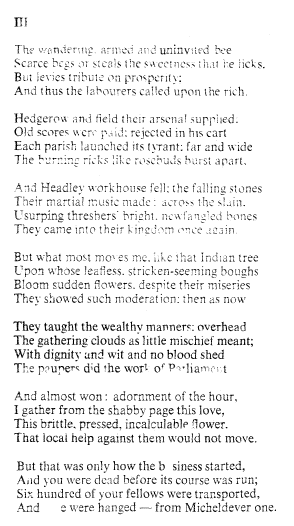Five Thousand Poets Under One Roof
- Introduction
- Copyright and Acknowledgments
- Index of Poets and Translators
- Index of Translated Poets
- The Poets
Introduction
This annotated index comes out of an attempt, begun in 1946 and not quite ended in the now of 2003, to identify the 5000, or so, best poets anywhere who have used some form of English from 1100 to about 2000, and includes their best poems, as well as excerpts from plays in poetical form and translations into English. So many millions of books of poems in English have already been published, and anyone who tries to confront them is a Canute trying to stem an incoming sea. So to start with, one must rely on the hundreds of thousands of scholars, librarians, critics, publishers, booksellers, readers, and others who created, presented, preserved and selected. And then one wades into the unknown. And the result can teach would-be poets their craft, turn living larvae into butterflies, and saves readers spending energy (and time which once wasted never returns) searching for and not finding their heritage, and wrongly concluding from what they find that their inheritance is far less than it is. Even the most fanatically narrow-and-persnickety of poetry lovers will find what they will defend against all others, if they persevere in ranging up and down this collection.
Like a broadening river, this collection and collation’s small beginnings began in an attempt to make an anthology of my favorite poems and went on to try to improve on that excellent anthology edited by John Hayward and called The Oxford Book of Nineteenth-Century Verse, published in 1964, and sadly, now out of print. All this was for myself, and it wasn’t till many years later that I realized that what I was accumulating could be used by others. Up to then, some of the poems here lacked bibliographical material, which I didn’t need for my purposes. Since then, I did make bibliographical notes, but have, with a few exceptions which seemed warranted, omitted them here. That should not take away from the enjoyment of the poems. I did at all times try to find the best and most accurate editions. Those who want to, will be able to find the materials for themselves.
No attempt has been made to select poems typical of an author, as these are often not their best. A typical selection, when it does happen here, happens by accident.
The selections are my personal taste, though some I relish more than others. But this does not mean there is no additional standard, and this will be found piecemeal, here and there in the comments. These comments are mere tools which some will find useful and others won’t need, and still others hate, as this is the way of this world of ours.
To put poems made in English in perspective, there are 2,000 to 10,000 languages in the world, depending on how one defines a dialect, and each has its poetic corpus.
A box, containing a 24th of the collection was lost during a move, and I was able to replace only a fraction of the poems in it.
The index starts in the 20th Century with those whose surnames begin with A, goes on to the 19th Century, and then to the 18th, to the 17th, to the 16th, and lastly to the 15th and before. It then starts again, with B, and so on. But 20th century XYZs will appear, for a time, before most of the rest of the alphabet does, though always retaining its position at the end.
I have provided three categories for the poets and poems, to help those who wish to know which are the best, and second-best and third-best, without having to plough through all the vastitude of this collection to find them. At the same time to promote the freedom of readers to create their own constellations and throw off what may be for them the shackles of my opinion, I have treated each poet individually, and have printed all the best poems of some only, and of others only some of them. But to other poets I have added all or some of their second-best poems, still of worth in their own right, to show the width of the resultant gap in value, and usually I have done this without remarking on it. And the best of one poet may be worse than the worst of another. The three categories are marked by an A, a B, and a C. Sometimes two of these letters together point to an intermediate category. Poetic value is not tied to how many poems a poet has here.
There is a fourth category, bigger than all the other categories together, which took up most of my exploratory time. These I have kept no record of. The poems in it are too technically inadequate or too unimaginative or have only one or a few lines of worth buried, usually forever, in the stodgy sandwich of the rest of the poem. For even the form and sound of the most apparently non-realist or realist poems are useless vehicles unless the sounds and/or the meanings are imagined, and no amount of additives in the reading of them aloud, will make the poems themselves move, though the readings may move some people. Not that a poem need move one, but these readers invariably try to, being more concerned with an agenda than the poem, and hope that by moving some people, usually to anger, they will get them to agree with them. This form of politics, policy and faith hijacks forms of poetry for other ends. This too is the way of the world, as is my objection to it. Of course, A, AB, B, BC, and C political poems are included here, whether I like their views or not, when the politics in them are only one of the ingredients, and can be poetically nutritious.
There are a few specialized anthologies I am very indebted to, such as Tom Leonard’s.
The words of most songs cannot stand up without their music, so only a few appear here.
Longer poems (banned from most anthologies for lack of space) get their space here.
I have lowered the bar on some of the translations, holding that the differences, of subject matter and the treatment of it, insofar as a translator has presented them, have a value irrespective of other accuracies and parallels that may be missing. The names of the translated precede the main index. I have read all the books of these poets (and of countless others) except for maybe those of a hundred and fifty of the poets included here, and the exceptions were not from laziness but from lack of access in one way or another.
S indicates a soundtrack for a poem or part of it.
An asterisk next to a poem’s number means that something is said about it in the comment.
A good dictionary, such as the O.E.D. will be useful.
Some of these poets deserve what they have not had, which is a collected edition of their poems. Arise from sleep, ye theses makers and lay about ye. (Not so much be-labor as lay the necessary books about you on the table you are at, unless you are more comfortable on the floor.)
As tolerance is desirable among people, so is tolerance of the poetical gamut. Every period whose poems survive has at least some good poems. And a whale of a reader will find nearly as many minor poems here as there are krill in the sea.
Copyrights and Ackowledgments
Please contact me.
Index of Poets and Translators
Forthcoming.
Index of Translated Poets
Agentarius, Marcus. from the (ancient) Greek. Translated by Fleur Adcock. Poems 36 and 37.
Anonymous. Lament of Heledd (based on a fragment of a 9th Century Welsh Saga Poem.) Translated by Dannie Abse. Poem 19.
Bosquet, Alain. From French. Translated by Jesse Abbot. Poems 1 and 2.
Goll, Ivan. From French. Translated by Lionel Abel. Poem 1.
Goll, Ivan. From French. Translated by Leonie Adams. Poems 1, 2, and 3.
Gwyned, Hywel ab Owain. From 12th Century Welsh. Translated by Dannie Abse. Poem 20.
Rimbaud, Arthur. From French. Translated by Lionel Abel. Poem 2.
Valery, Paul. From French. Translated by Leonie Adams. Poem 7.
The Poets
- Aaronson, L.
- Abad, Gemino H.
- Abbe, George
- Abbot, Jesse
- Abbott, Kathleen W.
- Abel, Lionel
- Abercrombie, Lascelles
- Abrahams, William
- Abse, Dannie
- Ackerley, J.R.
- Ackerman, Diane
- Acland, Valentine
- Acorn, Milton
- Acton, Harold
- Adair, Virginia Hamilton
- Adam, Helen
- Adams, Annie
- Adams, Arthur H.
- Adams, Franklin P.
- Adams, Henry
- Adams, Leonie
- Adams, Sam
- Adamson, Margot Robert
- Adcock, Betty
- Adcock, Fleur
Aaronson, L. (A)
Active 1917-1948, British
Comment: Aaronson is that rarity of the 20th century, a very good poet who is physiologically religious; that is, when you take away the belief in the form his religion takes, which is a form of Christianity; and then take away therapeutic sound and emotional outlet which you can't take away from him, as he doesn't use it in his poems, you are left with a being that is still religious and relates, to himself and the world, out of that being. He finds his affinity as a poet in the17th century poet, George Herbert. In life and art, such oceanic beings as his, find homes, for their own forms, in shells long abandoned by others as places to live in. The hiss in poem 10 is the sound made by gas-lights.
- The Bliss (A)
- The Baptism (A)
- Siesta (A)
- The Medium (A) (missing)
- Cloudy Night (A)
- The Two Voices (A)
- The Aeroplanes Go Over (A)
- The Garden At Evening (A)
- Walking By Marylebone Cemetery — Evening (A)
- Midnight (A)
1. The Bliss
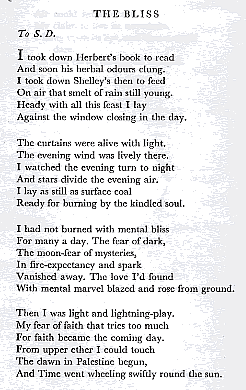
2. The Baptism
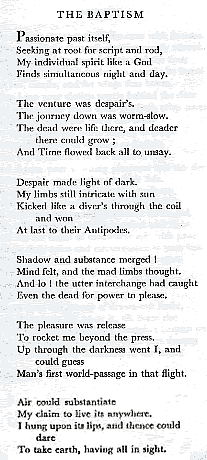
3. Siesta
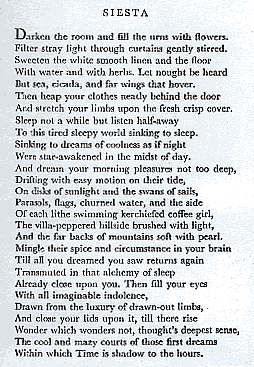
4. The Medium (poem missing)
5. Cloudy Night
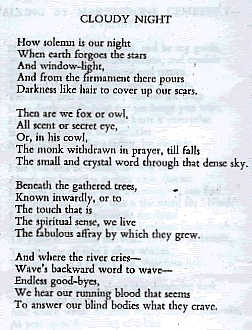
6. The Two Voices
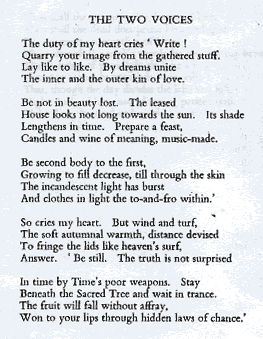
7. The Aeroplanes Go Over
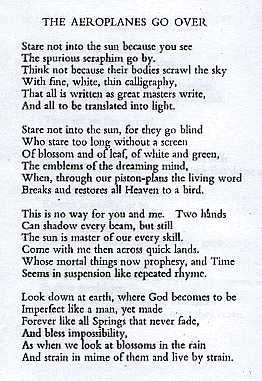
8. The Garden At Evening
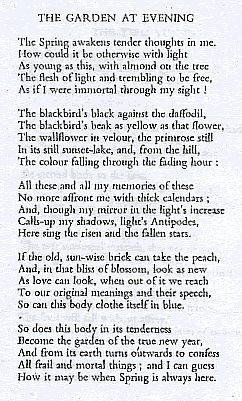
9. Walking By Marylebone Cemetery — Evening
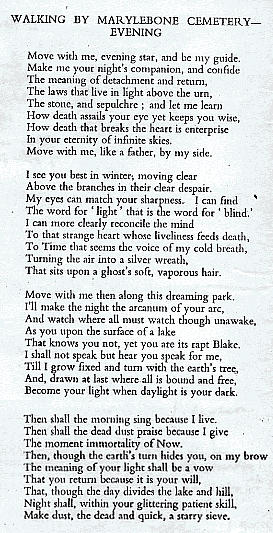
10. Midnight
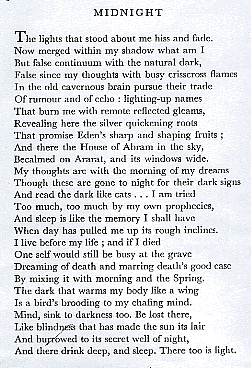
Abad, Gemino H. (A)
1939-, Filipino
Comment: A strobil can be a coating made of opaque scales, such as fish have. So, in stanza1V, shedding scales from the strobils of the quester's outlook and innermost and subtlest being, gives increasingly clearer and better vision. There is a wealth of personal experience in this poem. Rereading will yield more meaning, and if obscurities remain, the potency of this poem survives them, difficult, attractive, and rewarding in pursuit. The height of a mountain is not decreased by the cloud that obscures it.
Not everyone's cup of tea. For almost everyone it is too hot, I think, to gulp down in one go. One needs patience and thirst. And the belief (gained from readers' experiences of their own ignorance before seeing solutions to problems they lived with) that having a go at the poem again and again wherever the yield was blankness, may end in being hugely rewarding.
Luckily, this poem came up almost first in this index. I think it one of the greatest 20th century poems, and perhaps the least known of them. No other poem by Abad equals it. It is one of a cluster of 3 poems for his father. 1976.
There is more on this poem in the comment on George Abbe.
The abundance and richness of Filipino poems in English, since the first one published in 1905, is astonishing, and our knowledge of them owes much to Abad.
- The Figure Of His Sphinx (A)
In Another Light
University of Philippines Press
Quezon City, Philippines, 1976
I
He did his work well
Because his heart was not in it.
It was essential to be indifferent
When the need for authenticity ran counter
To every other need.
What he had to do he did quickly,
Even boldly,
Before the desire overtook its long shadow,
So that afterwards the deed looked monstrous,
Like a bird with wings too small for flight
Since the desire had come too late
To give it or shape or aim.
II
As he had catalogued each grief or desire,
There was nothing he did not already know
By its own proper name.
No bellows would stir up fire
From his prodigal ash.
The ebb and flow of indefeasible order
About the bold reef of his hypothesis
Only provoked a feat of survival
That lacked the fortune of a shore.
III
And so at last,
He grew strange toward human sentiment
And felt ridiculous in his pew
Where he read the names of donors
That breathed the odor of a forgotten catechism.
Shall typhoons renew him?
He had only seen
The lights of distant boats
Drowning in the lusty squall.
No dream could raise
Against his survival
A raucous flock of long-winged
Sea gulls.
From prayer books
He had only sipped maigre gruel
That would not drag the rickshaw
To his door.
No sybil with sickle
Eyes in the soul's wilderness
Could unriddle the wastes
Of his dissolution.
1V
He had laid to rest long ago
The noisy symbols of his youth
Since the appetite for reason was a disease
Of the antique mind, too poor in secular history.
And yet, by what virtue or destiny
Did the rebel once bear his love for custom
To the holy roots of his eternal disquiet?
Were his speeches left only for mice,
His last ally, in archives to criticize?
Why should now the strobils of his mind
Rain continually on the arid land?
V
So a rood of his mind slowly grew
Where a star raised the siege
To make amends for the clangor of his quest.
The wages of dead years fell like scales
From dry places of the soul embowered in weed.
It took no finding, it lay all about,
The compass of disillusion,
Like corrupt readings of other words
Than the imperious text of his obsession.
He sailed near the wind in discourses
That battened purposeless on time,
And found the pageant absurd
In which he alone was real,
The sound of his storming eye
Lifted for transport above his dusty saints.
Abbe, George (AB)
1911-1989, American
Comment: Both Abbe and Abad are A poets when at their best. But are they of equal value?
Usually, what readers can use poems for and their own skills with the tools the poems provide, rank the poets. Poems whose subject matter is wider and more important, as is the width and depth of the treatment and sound, and the rhythm stronger and from a deeper and more central and firmer part of the poets, really provide more tools for pleasure than lesser poems do. But lesser poems, with fewer tools, can have more or fewer prominent commonalities with better ones, and likable and usable qualities not, in some way, in the greater ones. Lesser poems give scale to greater poems, as people do to the features of a landscape they are in.
The more the reader can imagine the qualities of a fully human being, the more satisfying a reading will be. Pleasure in reading is an important quality, as is knowing how to read, and doing appropriate bodywork will increase reading ability, the hearing of patterns, and pleasure in them. Pleasure, it seems to me, promotes health and appropriate behavior, so that humans are like fruiting trees and not all the time bare and barren like dead trees. Though the satisfaction one gets in doing what one wants to may not lead to pleasure. Re-reading and accepting will help.
For poem 4, a good video of kingbirds flying near their nestlings needs to be made to help interpret the 17 or so words not in any dictionary so far as I know. However, listening to the sounds of these words will eke out the meaning. One of the easier of these words is the short-vowelled peri-totting which sounds like, and means, moving with short steps round something, though here these movements are in the air. (Peri = about, and tot =short step).
- Former Homeland (AB)
- The Ancient Dwelling (A), 1957
- From the Fields Below (A), 1970, New Poems, 1961-1970
- Kingbirds Topple Backward in Midair (A), Ibidem
- Young Marriage and the Ski-Run (AB), Ibidem
- Tennis in the Forenoon (AB), Ibidem
- Conversation with a Friend (AB), Ibidem
1. Former Homeland
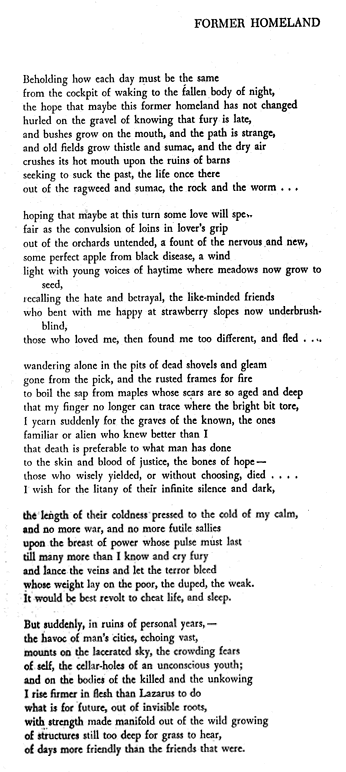
2. The Ancient Dwelling
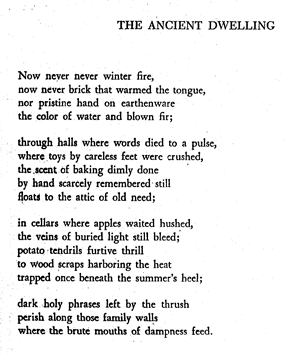
3. From the Fields Below
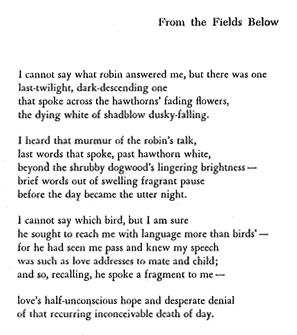
4. Kingbirds Topple Backward in Midair
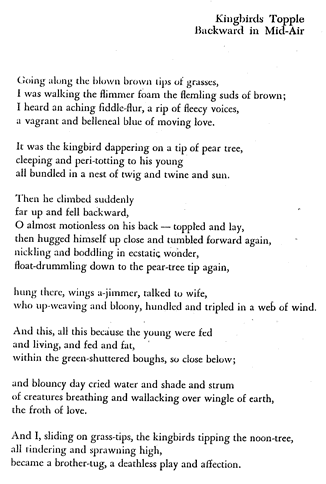
5. Young Marriage and the Ski-Run
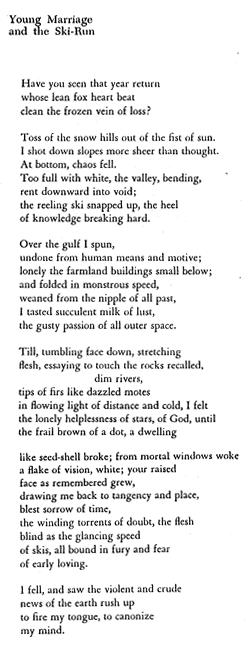
6. Tennis in the Forenoon by George Abbe

7. Conversation with a Friend
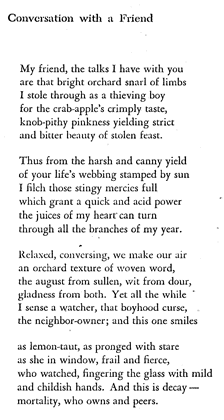
Abbot, Jesse (B)
From the French of Alain Bosquet.
Two poems from God's Torment.
Comment: In the original, the sound has more importance, I think.
Two poems from God's Torment
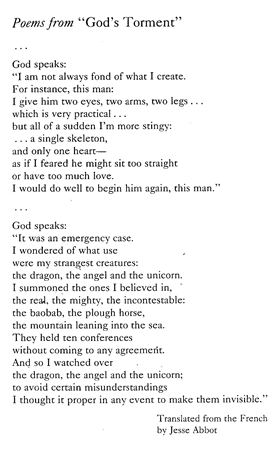
Abbott, Kathleen W. (B)
British
Comment: For best results, don't be put off if the beginning seems too prosaic. Read to the end.
- Chalk Fields (B)
Abel, Lionel (A)
1910-2001, American
- Poem
From the magazine Pagany; not in any book he put out, so far as I know (A)
Comment: Where the sound is right, it is less important to know what is being referred to. (Exemplified here.) - Jean Sans Terre Manufacturer of Night (A) Translated from the French in Ivan Goll's book Jean Sans Terre (Landless John or John Lackland. My translation. Rootless cosmopolitan maybe fits too.). Comment: Goll was lucky. Several good poets translated him well, and only a few failed. Rimbaud was lucky too, but many more translated him, and many more failed.
- My Bohemian (A)
Translated from the French of Arthur Rimbaud.
1. Poem
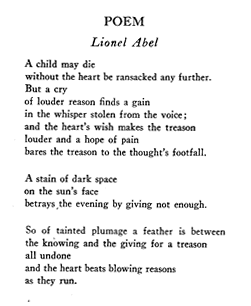
2. Jean Sans Terre Manufacturer of Night

3. My Bohemian
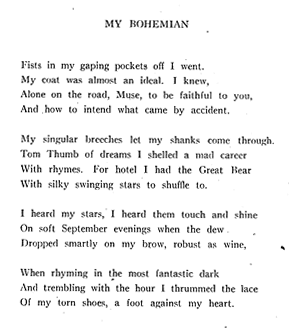
Abercrombie, Lascelles (A)
1881-1938, British
Comment: Abercrombie would be deservedly better known if his best poems weren't among his longer ones, so that the few anthologists who knew and valued his poems after his death would, for reasons of space, exclude them to make room for more poems by more poets. The other reason for his exclusion from the pantheon of good poets is the tendency of many human minds to be able to hold only one thing at a time, so if it were as apparently diverse a duo as Abercrombie and T. S. Eliot, only one of the two could occupy the poetry public's mind. And then because most anthologists forge ahead in the footsteps of those in front of them, the losing poets are forgotten unless critics of note take up their cause, which seldom happens, as there is usually something of the sheep in them too.
- Mary and the Bramble (A)
- The End of the World (A)
- Ham and Eggs (A)
- Ryton Firs (A)
- The Olympians (A)
1. Mary and the Bramble

2. The End of the World





3. Ham and Eggs

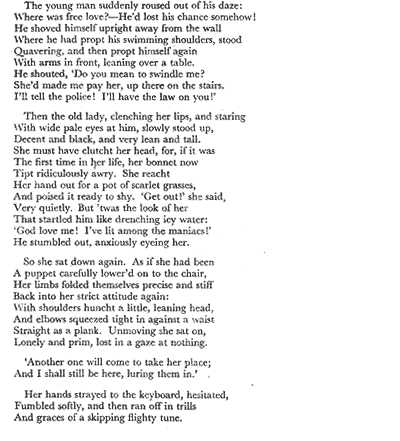
4. Ryton Firs

5. The Olympians


Abrahams, William (B)
American, 1919-1998
Comment: This series of unrhymed sonnets does not imitate 19th Century, or earlier, sonnet sound patterns, which would be inappropriate; and that's an achievement. They are also cleverly-done and tasteful observations, but without much depth, as if they were a neat job, turned out while sitting in a comfortable armchair, freeing their author for some subsequent trivialities, in daily life, requiring the same level of attention. Or am I, the critic reader, the one in the armchair?
- The Museum (BC)
Abse, Dannie (B)
1923-, British
Comment: Abse's Welshness, Jewishness, and medical skill give him perspectives that enrich some of his poems. (He thinks his writing is more important than his doctoring. His life, in this respect, like a bicycle, one of whose two wheels is smaller.)
- Social Revolution in England (B)
- Return to Cardiff (B)
- Smile Please (B)
- A Winter Visit (B)
- Pantomime Diseases (B)
- A Welcome in the Wolds (B)
- A Translation from the Martian (B)
- Talking to Blake (B)
- The Mistake (B)
- The Excavation (B)
- History (B)
- Breakfast Together (B)
- Just One of Those Days, William (B)
- Touch Wood (B)
- Watching a Cloud (B)
- After a Departure (B)
- Ghosts, Angels, Unicorns (B)
- Autumn in Funland (B)
- The End of Funland (B)
- The Boasts of Hywel ab Owain Gwynedd (B)
- Lament of Heleth Translation (B)
- Welsh Valley Cinema, 1930s (B)
- Refugee (B)
- Soho: Saturday Night (B)
- From: Events Leading to the Conception of Solomon, The Wise Child (B)
- Demo against the Vietnam War, 1968 (B)
- The Death of Aunt Alice (B)
- One Sunday Afternoon (B)
- Phew! (B)
- Last Visit to 198 Cathedral Road (B)
- Friends (B)
- Brueghel in Naples (B)
- A Note to Donald Davie in Tennessee (?)
1. Social Revolution in England
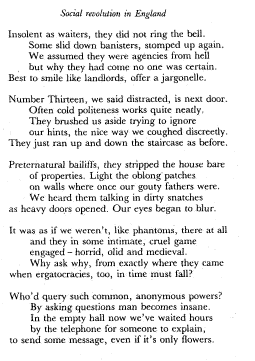
2. Return to Cardiff
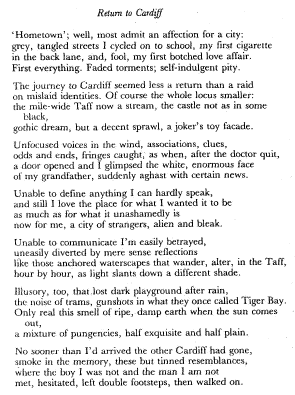
3. Smile Please
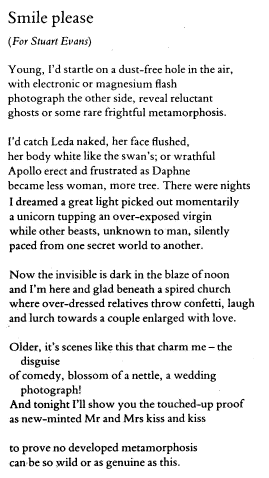
4. A Winter Visit
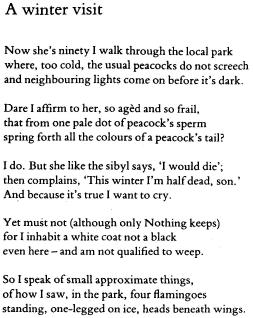
5. Pantomime Diseases
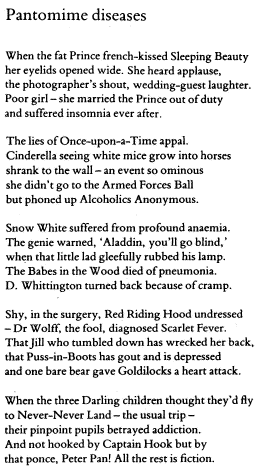
6. A Welcome in the Wolds

7. A Translation from the Martian
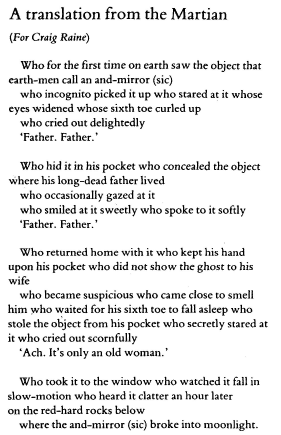
8. Talking to Blake
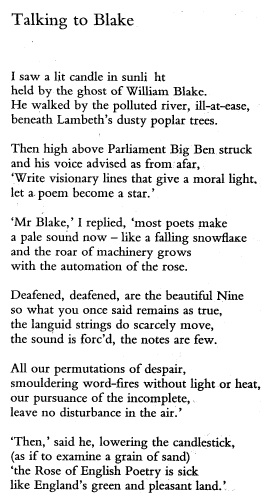
9. The Mistake
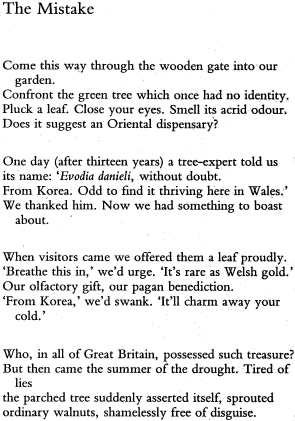
10. The Excavation
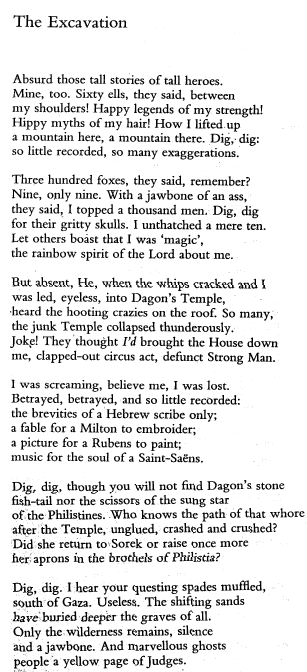
11. History

12. Breakfast Together
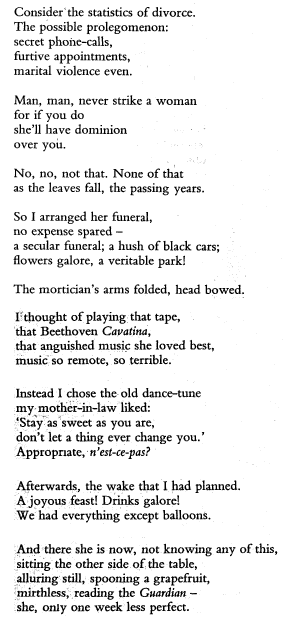
13. Just One of Those Days, William

14. Touch Wood

15. Watching a Cloud
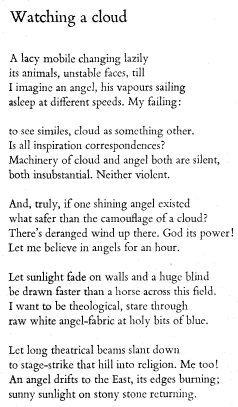
16. After a Departure

17. Ghosts, Angels, Unicorns

18. Autumn in Funland

19. The End of Funland

20. The Boasts of Hywel ab Owain Gwynedd
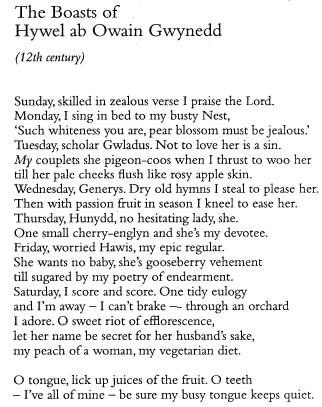
21. Lament of Heleth Translation
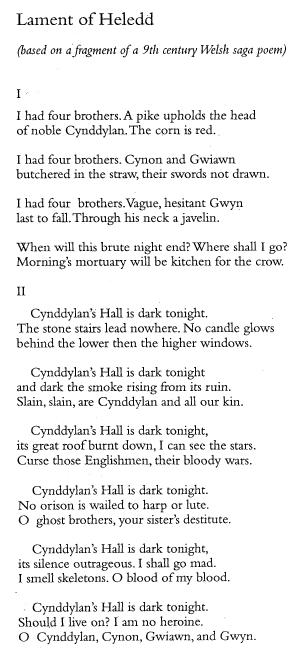
22. Welsh Valley Cinema, 1930s
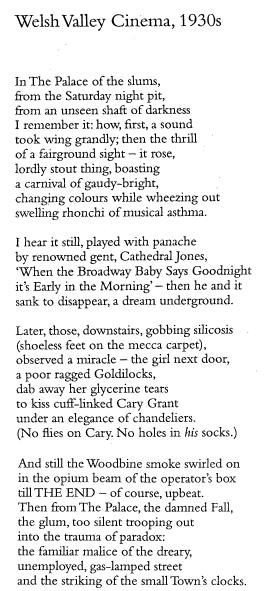
23. Refugee
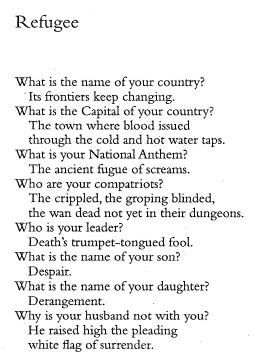
24. Soho: Saturday Night
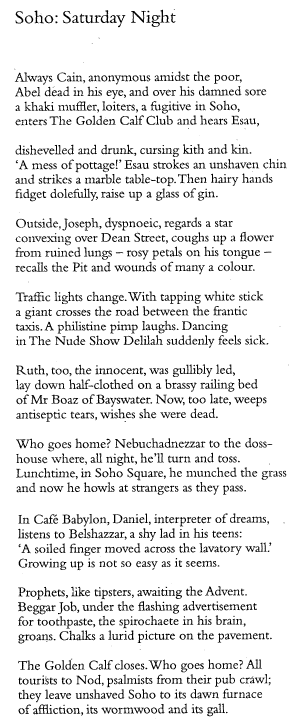
25. From: Events Leading to the Conception of Solomon, The Wise Child
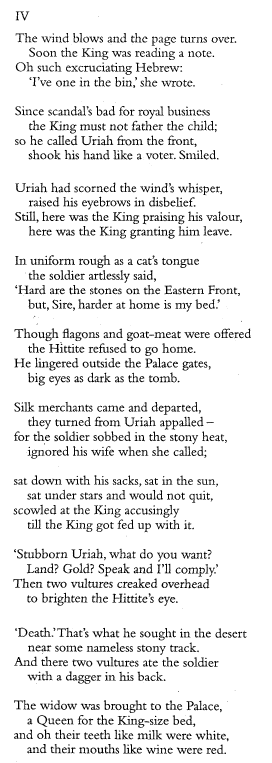
26. Demo against the Vietnam War, 1968
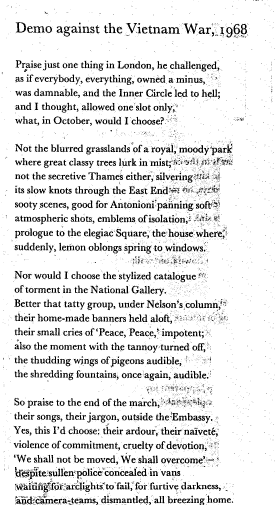
27. The Death of Aunt Alice
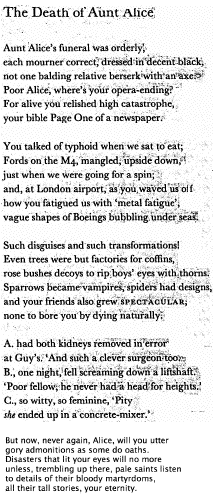
28. One Sunday Afternoon
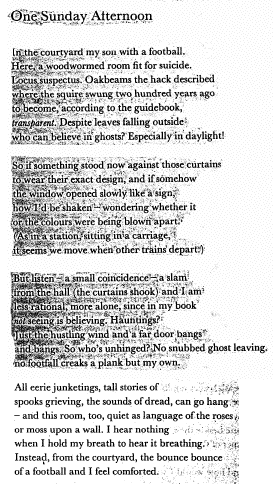
29. Phew!
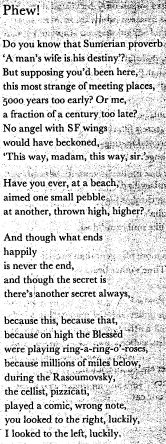
30. Last Visit to 198 Cathedral Road
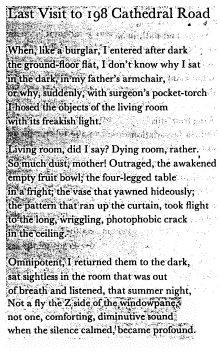
31. Friends
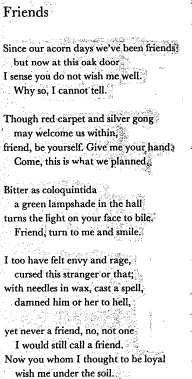
30. Brueghel in Naples

31. A Note to Donald Davie in Tennessee
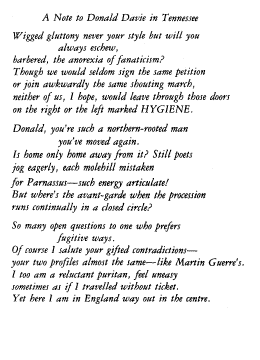
Ackerley, J.R. (A)
1896-1967, British
Comment: I have left out the B ascent and downslope to and from the plateau whose perfection of sound I give. This gives an opportunity in a small compass, for readers who want to, to see if I was right to do that. I may avail myself of the opportunity too. (The full text will be found in Micheldever and other poems. 1970.) The excerpt given here, refers to the Micheldever agricultural laborers during the 19th Century agricultural troubles in England.
- Excerpt from: Micheldever (A)
Ackerman, Diane (A, B)
1948-, W, American
Comment: The surprising 17th-century poet, George Herbert, jumps non-theologically into the 20th century in 1 (and jumps theologically and non-theologically into the 20th century in Aaronson's poems); in Lady Faustus, the second part of 1V answers the question at the end of the first part of 1V.
- From: Tales from a Sonnetarium (B)
- From: The Planets: A Cosmic Pastoral (1976) (A)
- In A Science-Illustrator's Apartment (AB)
- Golden Section, Giants Stadium (B)
- Lady Faustus (B)
- On Other Couches (B)
- Grace (B)
1. From: Tales from a Sonnetarium
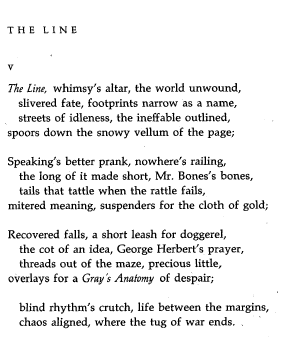
2. From: The Planets: A Cosmic Pastoral (1976)

3. In A Science-Illustrator's Apartment

4. Golden Section, Giants Stadium
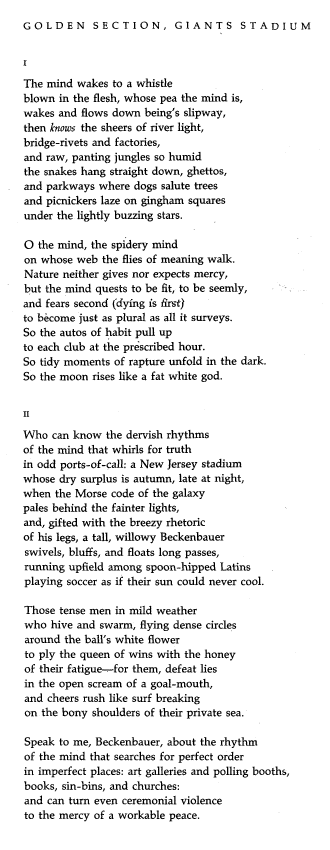
5. Lady Faustus

6. On Other Couches

7. Grace
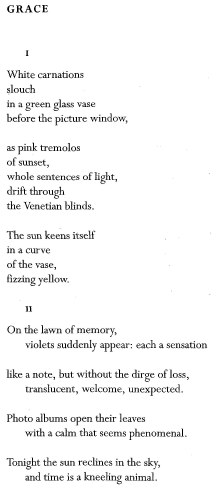
Acland, Valentine (AB, B)
1906-1968, W, British
Comment: The AB poem's meshed sound and meaning are more organic than that of the other poems, and more creative, and less strait-jacketed though more disciplined.
- (No title) Poem beginning: Built out of dark shapes (AB)
- Journey from Winter (B)
- Of Death and Judgement (B)
- Notes from a Diary (B)
- Night Prayer (B)
1. (No title) Poem beginning: Built out of dark shapes
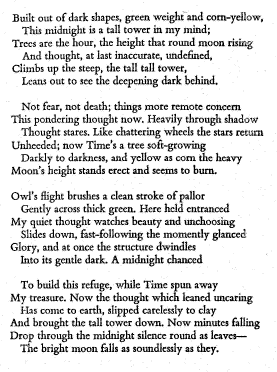
2. Journey from Winter
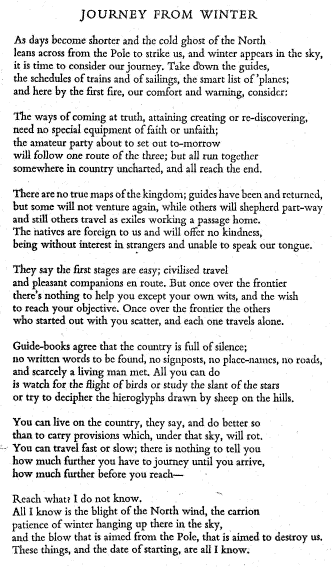
3. Of Death and Judgement
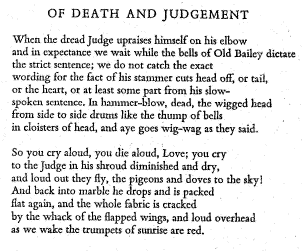
4. Notes from a Diary
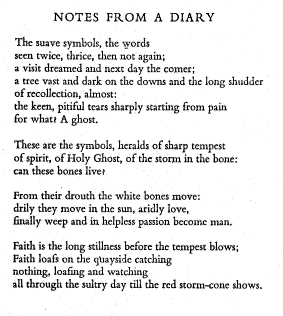
5. Night Prayer [MISSING]

Acorn, Milton (AB)
1923-, Canadian
Comment: I watch my wallet not only to make its sparse contents last longer but also out of fear of being robbed.
- Knowing I Live in a Dark Age (AB)
- To a Cockroach (?)
- Lapse (?)
- Love of the World (?)
- My Big Heart (?)
- Sonnet of the Most Unthought Thought of Mao (?)
- Of Time and the Fighter (?)
1. Knowing I Live in a Dark Age
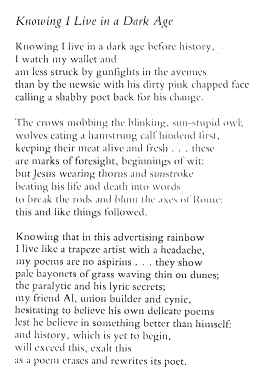
2. To a Cockroach
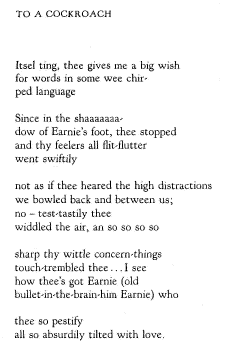
3. Lapse
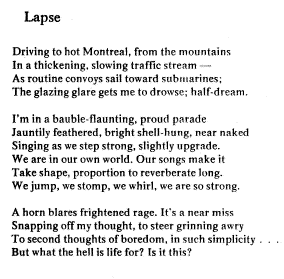
4. Love of the World
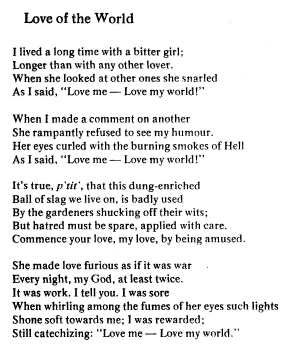
5. My Big Heart
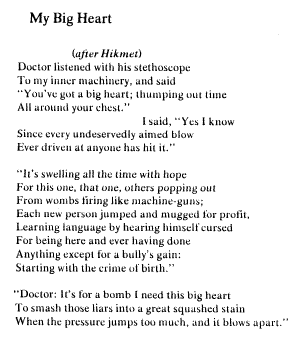
6. Sonnet of the Most Unthought Thought of Mao
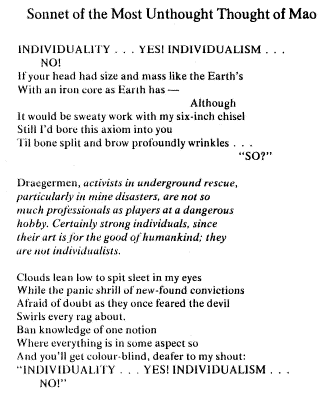
7. Of Time and the Fighter
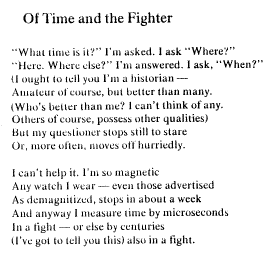
Acton, Harold (A)
1904-1994, British
Comment: Exuberance is a form of freedom, leaping like flames through the iron grid of convention.
- St. Catherine of Alexandria, Or The Recruiting of Martyrs(A)
Adair, Virginia Hamilton (A, B)
1913-, W, American
Comment: The sounds inhering in these revelatory As exalts them above the inherent wit and wisdom of the Bs. In most poems what the sounds do with the lexical meaning determines their poetical value (though not always the value of a poem).
- Buckroe, After the Season, 1942 (A)
- By Old Maps (A)
- The Genesis Strain (B)
- Blueberry City (B)
1. Buckroe, After the Season, 1942
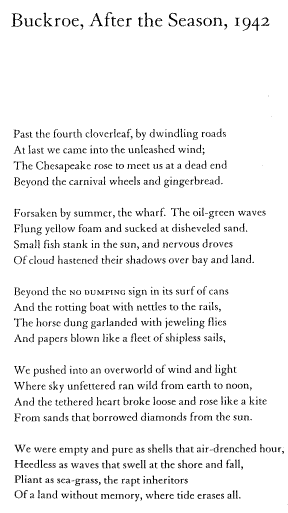
2. By Old Maps
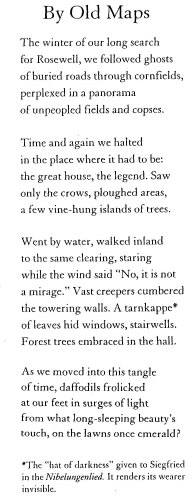
3. The Genesis Strain

4. Blueberry City

Adam, Helen (A)
1909-1993, W, British and American
Comment: A dramatic variant and offshoot of the Scottish ballads of centuries ago, they are spot on. As part of the drift of the 20th Century, they belong to the spoken word, without the tunes that added point to their predecessors.
- Variation On Shallow Water Warning (A)
- Deep in the Sub-Way (A)
- Naked in the Ditches (A)
- Tomorrow in the Morning (A)
- Crow Feathers Falling (A)
- Third Eye Shining (A)
- The Witch's Daughter (A)
- Stone Cold Gothic (A)
- Kiltory (A)
- Limbo Gate (A)
- The Lily Cup (A)
- Night Nursery-Rhyme (A)
- Song for a Sea Tower (A)
- Farewell, Stranger (A)
- Doll Song (A)
- A Magic, Moral Tale (A)
- The Fair Flowery Lea (A)
- A Tale Best Forgotten (A)
- I Love My Love (A)
- Stable Boy's Song (A)
- The Berkinshaw (A)
- Shallow-Water Warning (A)
- The Huntsman (A)
- The House o' the Mirror (A)
- Mune Rune (A)
- The Winds of Spring (A)
- The Stepmother (A)
- Counting-Out Rhyme (A)
1. Variation On Shallow Water Warning
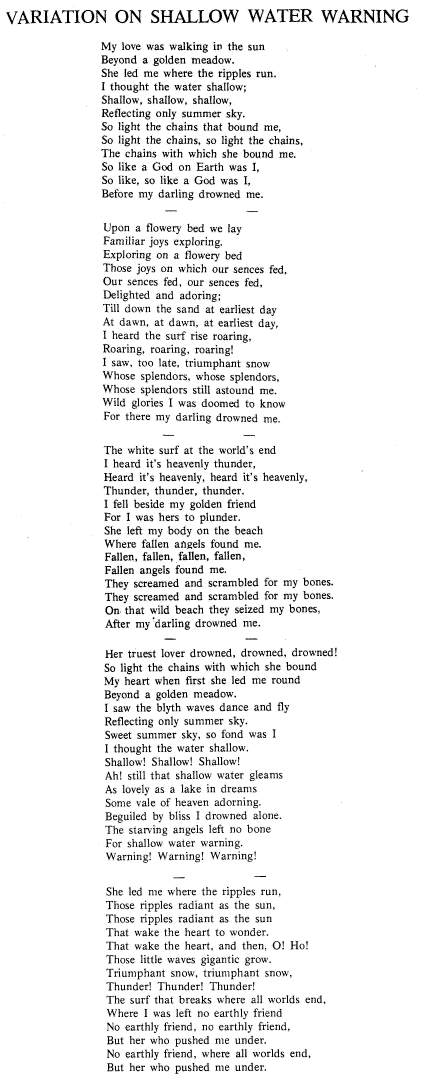
2. Deep in the Sub-Way
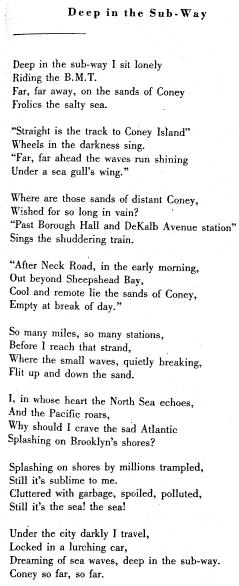
3. Naked in the Ditches

4. Tomorrow in the Morning

5. Crow Feathers Falling

6. Third Eye Shining

7. The Witch's Daughter

8. Stone Cold Gothic
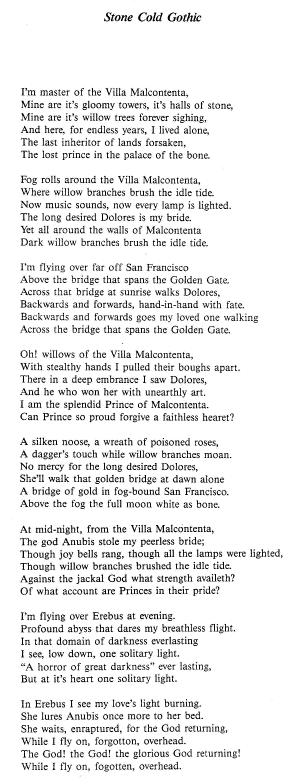
9. Kiltory
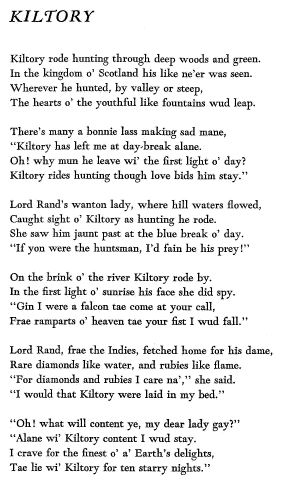
10. Limbo Gate

11. The Lily Cup
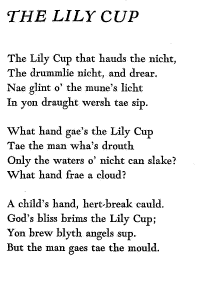
12. Night Nursery-Rhyme

13. Song for a Sea Tower
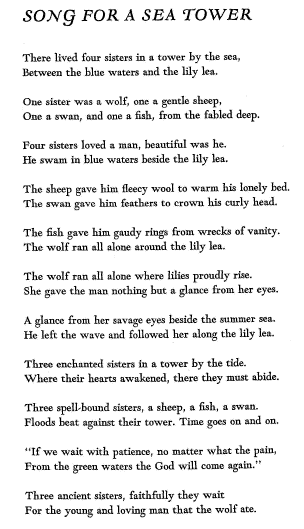
14. Farewell, Stranger
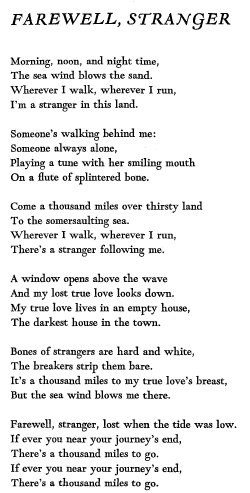
15. Doll Song

16. A Magic, Moral Tale

17. The Fair Flowery Lea

18. A Tale Best Forgotten
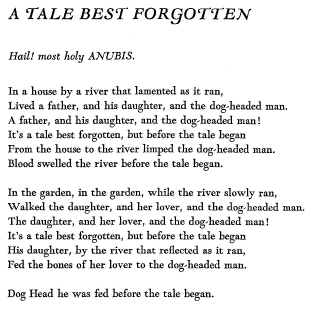
19. I Love My Love

20. Stable Boy's Song
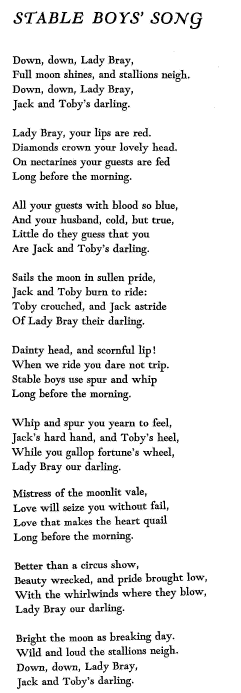
21. The Birkenshaw

22. Shallow-Water Warning
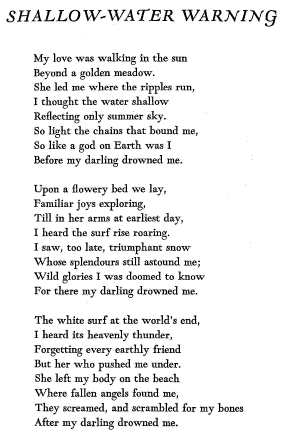
23. The Huntsman

24. The House o' the Mirror

25. Mune Rune

26. The Winds of Spring

27. The Stepmother

28. Counting-Out Rhyme

Adams, Annie (A, AB, B)
1926-, W, British
Comment: When I was in school I hated tests of the sort which asked: Give your reason, in under 100 words, why these three poems were, in your view, given their respective ratings? I still do. There were obviously so many possibilities. Apart from reasons resulting from analysis or the effects on one's emotions, maybe the rater himself didn't know why, or was tired by the time he got to poem 2, and even more tired by poem 3, and this had affected his judgement. Or, right or wrong, had spent hours figuring it out, and then decided he'd done enough, and stopped. In fact, these three poems weren't given their ratings for any reason. They were just the result of an automatic reaction, based on years of reading. And to uncover and unravel the reasons for the ratings would certainly take up time not available in tests and seldom in life. Though sometimes it is worth the effort, especially when a beginning reader and occasionally later on; as a way of disclosing the boundaries of one's prejudices, among other things. This sort of test is self-imposed at a propitious time and without time limits (for the thinking about it can go on and on, as opposed to a test imposed by others for as long as they like when it suits them. One is aimed at finding a truth, and the other at learning a skill. Each has its uses.
1. Black-House Woman
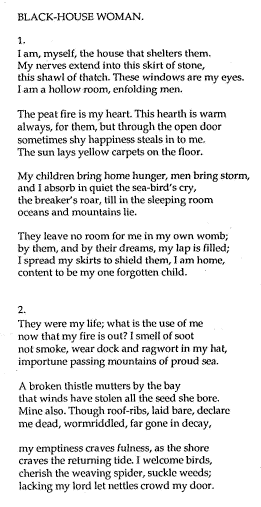
2. A Burial at Horton

3. Dragonfly Considers Helicopter
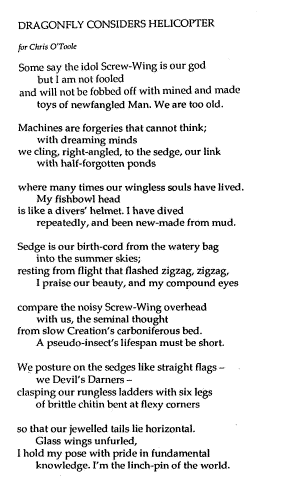
Adams, Arthur H. (A)
1913, Australian
Comment: Not only is this poem a humble representative of the lost, forlorn, and neglected, but it is also representative of one of the two dominant poetic forms, the "crafted poem", which is sometimes lyrical, as this one is, as opposed to poems written as lyrics, and which dominated the 14th to 19th centuries and even beyond, to about 1918, and are still being written.
- The Dwellings of Our Dead (A)
Adams, Franklin P. (A)
1881-1960, American
Comment: A master of light verse, whether combining slang with the ancient French Ballade form (poem 3), or translating from the Latin light verse of Horace (I suggest a pause after the first appearance of the word set to make the fourth stanza sound right. Its third line runs into the next whose 5 notes slide down compared to the third line (poem 4). Or whether combining baseball as a subject with another ancient French form (Poem 1). Or transposing a chunk of Milton into the ancient French rondeau form (poem 2).
- Baseball's Sad Lexicon (A)
- Results Ridiculous (A)
- Ballade to a Lady (A)
- Ad Xanthiamphoceum (A)
1. Baseball's Sad Lexicon
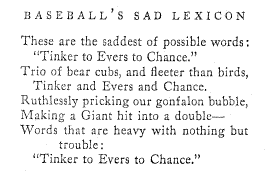
2. Results Ridiculous
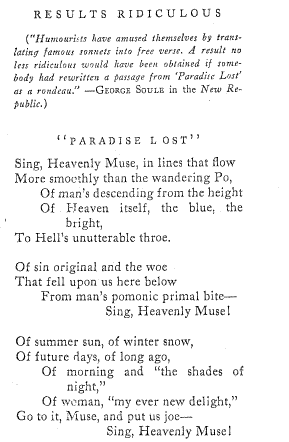
3. Ballade to a Lady
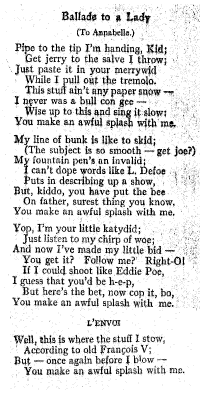
4. Ad Xanthiamphoceum
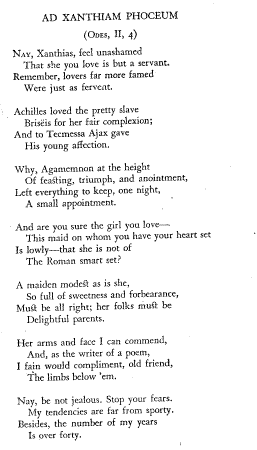
Adams, Henry (B)
1838-1918, American
Comment: Despite the interest of what he says and his mastery of form and rhetorical build-ups, the poem's lines lack a music of their own, which makes it a not A.
- Prayer to the Virgin of Chartres (Published 1901) (B)
1. Prayer to the Virgin of Chartres (Published 1901)

Adams, Leonie (A)
1899-1988, W, American
Comment: In the Jean Sans Terre translations, a few stanzas can sound abnormal in themselves and in relation to the others, but fit perfectly if spoken appropriately.
Her original poems have been neglected like paths overgrown with grass, after (not because of) a few appeared in the 1950's anthologies edited by that master anthologist of 20th century American poems, Oscar Williams, and after her later Selected poems.
There are Everests of translation. The originals and their translations cannot be approached in an ordinary frame of mind, for that mind cannot engage them and slips off them (at least if you are me today). It may be necessary to re-focus and grasp Narcissus bit by bit, hand over hand, the first time at least, for those who need to make sense of it.
- Jean Sans Terre: Lands (translated from the French of Ivan Goll) (A)
- Jean Sans Terre: Throws Himself on the Steps of Strasbourg Cathedral (translated from the French of Ivan Goll) (A)
- Jean Sans Terre: On the Peaks (translated from the French of Ivan Goll) (A)
- Words for the Raker of Leaves (A)
- Grapes Making (A)
- The Figurehead (A)
- Fragments from "Narcissus" (translated from the French of Paul Valery) (A)
1. Jean Sans Terre: Lands (translated from the French of Ivan Goll)
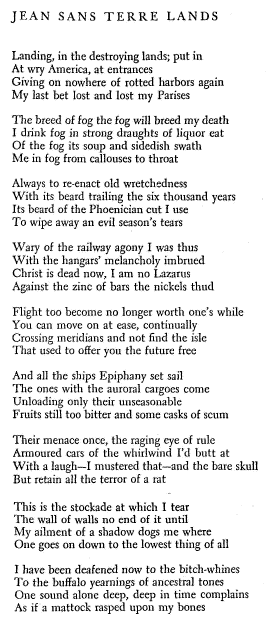
2. Jean Sans Terre: Throws Himself on the Steps of Strasbourg Cathedral (translated from the French of Ivan Goll)

3. Jean Sans Terre: On the Peaks (translated from the French of Ivan Goll)

4. Words for the Raker of Leaves

5. Grapes Making
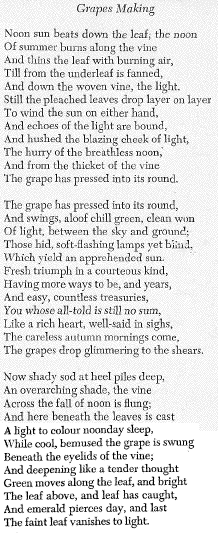
6. The Figurehead
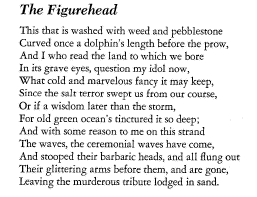
7. Fragments from "Narcissus" (translated from the French of Paul Valery)

Adams, Sam (A)
1934-, British (Welsh?)
Comment: Despite its rougher sound, it is rhythmically stronger than Henry Adams' poem, and that gets it the higher rating. But Adams should be listened to.
- Mynydd Gilfach (A)
1. Mynydd Gilfach

Adamson, Margot Robert (B)
W, British
Comment: Some of the originals of these translations are in the 15th century and earlier section under Anon. Shadows acts as a verb, in June in Essex.
- June in Essex (B)
- Mercy Passeth All Things (translated from anonymous Middle English) (B)
- This World Fares But As a Fantasy (as above) (B)
- Pilgrims at Sea (as above) (B)
- Filius Regis Mortuus Est Et Resurexit (as above) (B)
1. June in Essex
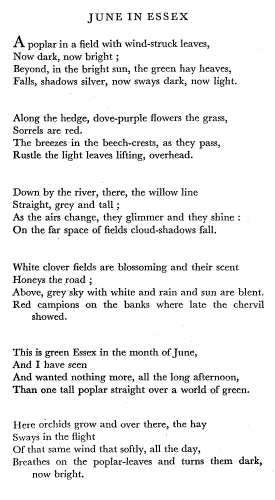
2. Mercy Passeth All Things (translated from anonymous Middle English)

3. This World Fares but as a Fantasy (as above)

4. Pilgrims at Sea (as above)

5. Filius Regis Mortuus Est Et Resurexit (as above)

Adcock, Betty (A)
W, 1938-, American
Comment: The hallmarks of this poem are groups of lines with each line ending just where it offers a meaning better than those available with syllables added or taken away from the lines next to them, to alert and careful readers; honesty (which tells the truth, and nothing but the truth) as distinct from sincerity (which believes in the truth of what is said, and is reserved for the reader, and includes the poet as reader); and varying rhythms controlled as needed to the end of the poem. These win, without a false move, invisible choices against going wrong anywhere along its length. This poem is subtlest where it seems simplest. If this poem were a horse, I'd bet on it.
- Things Left Standing (A)
Adcock, Fleur (A)
1934-, New Zealander
Comment: In Blue Glass, each phrase is handpicked as sound (and meaning)to relate to the sound and meaning of the phrase on each side of it, and belies the look of normalcy of the stanzas, just like the normalcy of middle-class life has much more going on under it than appears on its surface.
The stanzas look so normal and stereotypical on the page, but the phrases are a horizontal mosaic of relating individuals. As if each line (usually) consists of two or three shorter lines.
The same is true for poems 1 to 4 but the results are different each time, and firm.
The unambitious verse forms; and the importance given to trivia, or seeming trivia, and the non-puritanical indulgence in them by the middle-class bohemian, offend some of those who don't partake of them: flip-flops (of shoes), swam naked, eating cool grapes smooth to the sucking tongue, rinsed them from our teeth with wine, nibbled the chrysanthemums, the whisky has a smoky tang, like dark chocolate. (All quotes, and not satirical.)
- The Farm
- A Hymn to Friendship
- Smokers for Celibacy
- Meeting the Comet
- Sighisoara 1982
- Barometer
- In the Lift
- Lights Underfoot
- The Simplification of Vocabulary
- The Water-Levels of the Danube
- With Four Wings
- Flowers of the Field
- Artificial Blood
- Alcahest
- Folie a Deux
- Londoner
- The Eye of the Hurricane
- The Ex-queen Among the Astronomers</li>
- Blue Glass
- Tokens
- In Memoriam: James K. Baxter
- Tadpoles
- England�s Glory
- On the Land
- Excavations
- Street Scene, London N2
- Archipoet
- Bethan and Bethany
- An Emblem
- Lantern Slides
- Letter to Alistair Campbell
- Piano Concerto in E Flat Major
- Primus
- Villa Isola Bella
- Weathering
- Untitled 1 (orig. by Marcus Agenturius)
- Untitled 2 (orig. by Marcus Agenturius)
1. The Farm
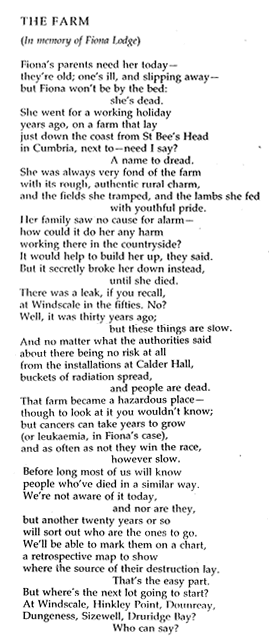
2. A Hymn to Friendship
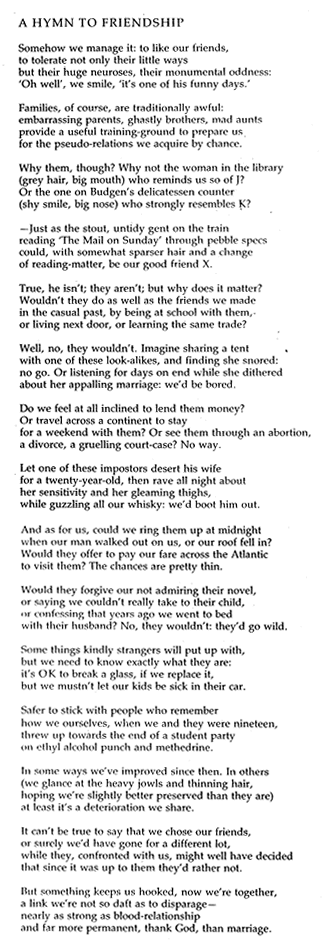
3. Smokers for Celibacy
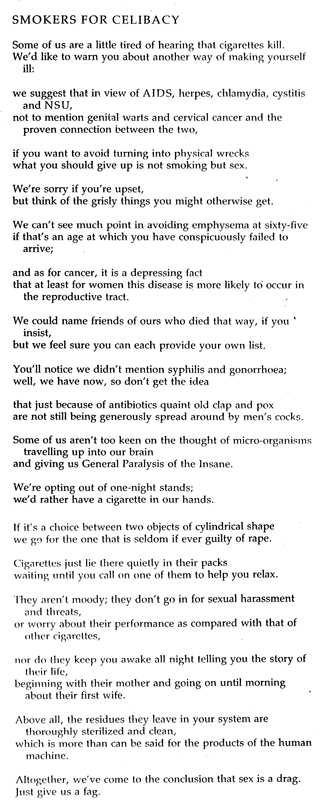
4. Meeting the Comet

5. Sighisoara 1982
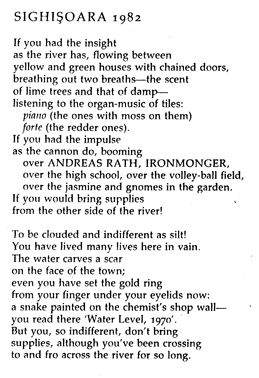
6. Barometer
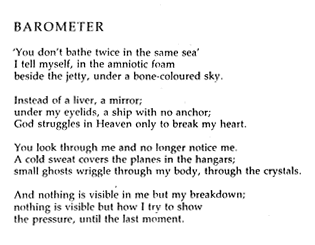
7. In the Lift
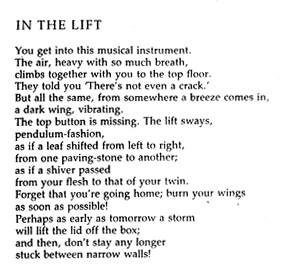
8. Lights Underfoot
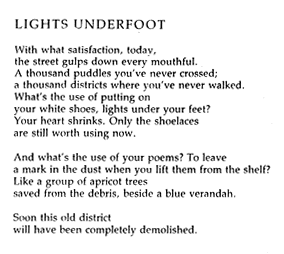
9. The Simplification of Vocabulary
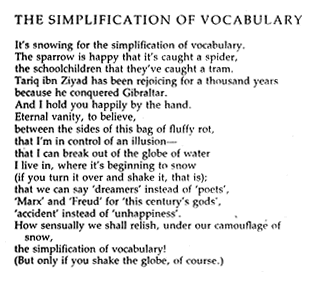
10. The Water-Levels of the Danube
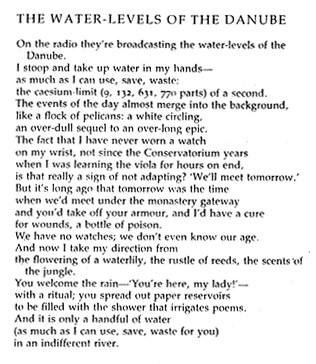
11. With Four Wings
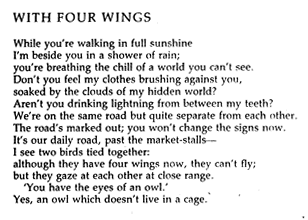
12. Flowers of the Field
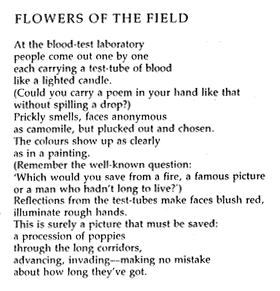
13. Artificial Blood
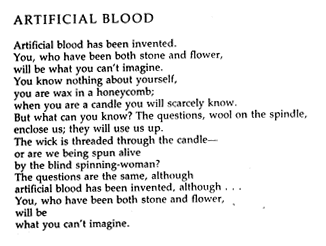
14. Alcahest
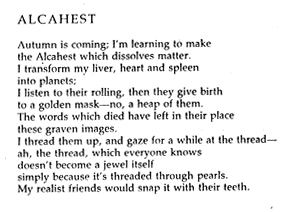
15. Folie a Deux

16. Londoner

17. The Eye of the Hurricane
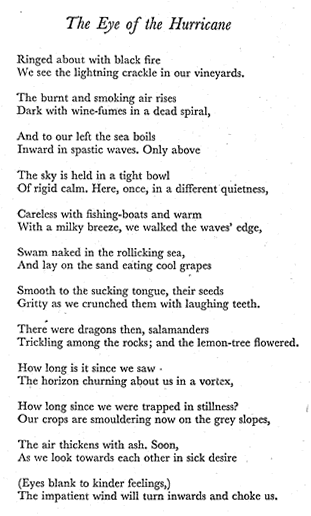
18. The Ex-queen Among the Astronomers
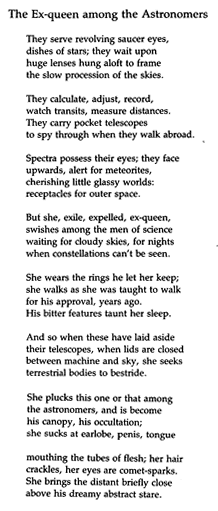
19. Blue Glass
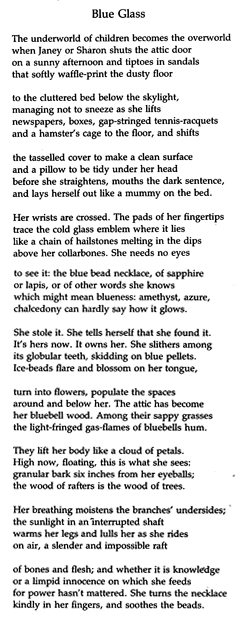
20. Tokens
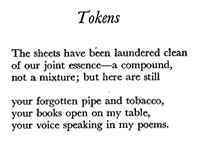
21. In Memoriam: James K. Baxter

22. Tadpoles
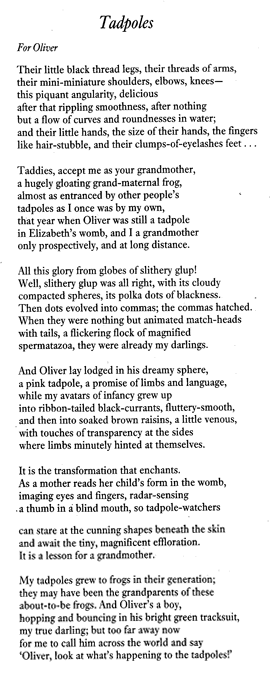
23. England's Glory
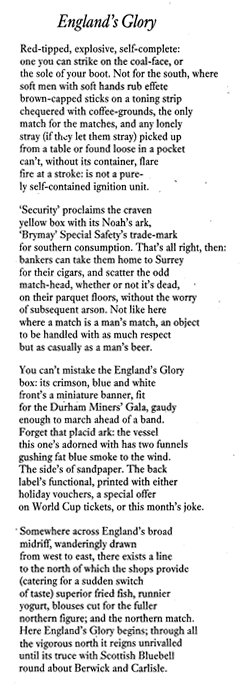
24. On the Land

25. Excavations
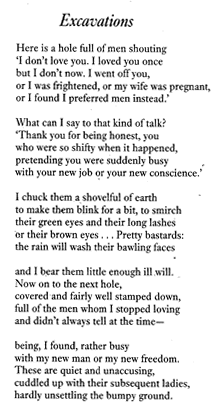
26. Street Scene, London N2
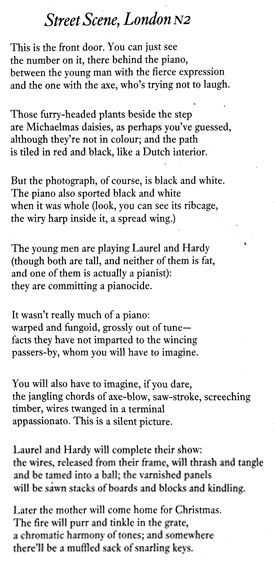
27. Archipoet

28. Bethan and Bethany
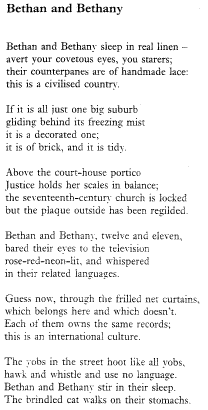
29. An Emblem
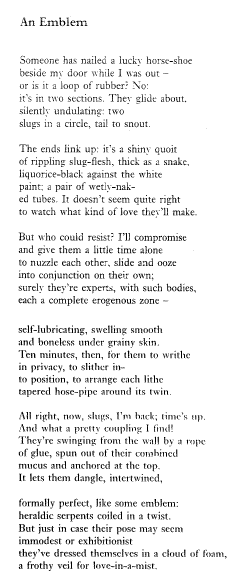
30. Lantern Slides
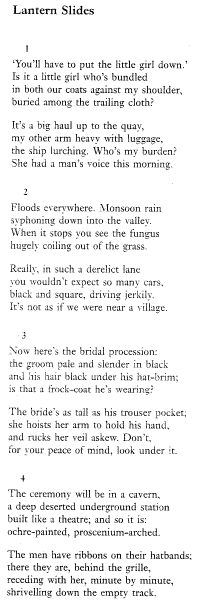
31. Letter to Alistair Campbell
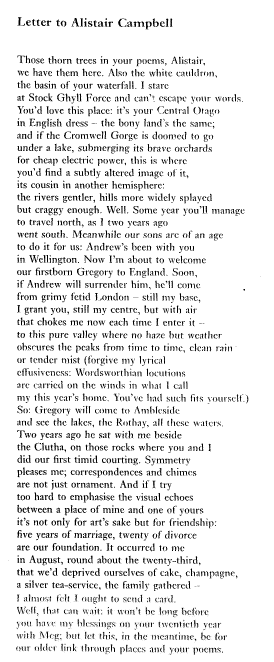
32. Piano Concerto in E Flat Major
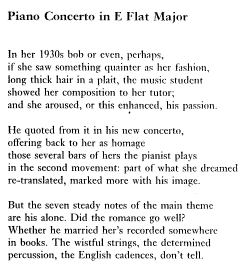
33. Primus
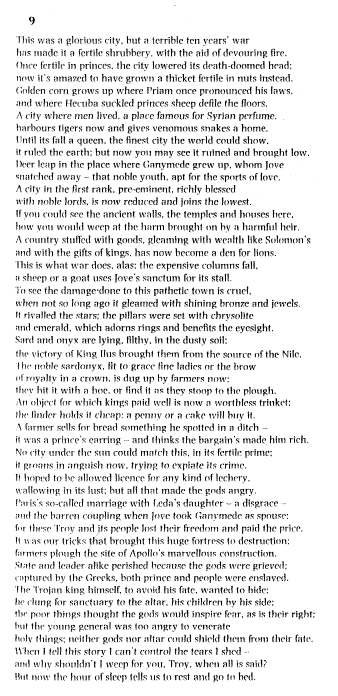
34. Villa Isola Bella
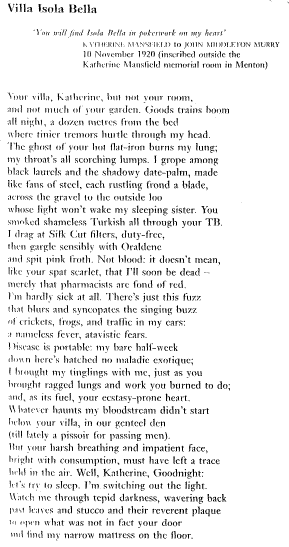
35. Weathering
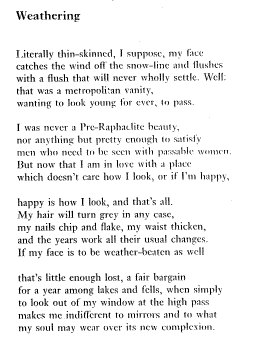
36. Untitled 1 (orig. by Marcus Agenturius)
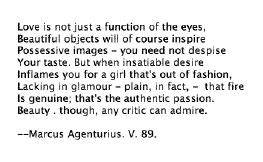
37. Untitled 2 (orig. by Marcus Agenturius)
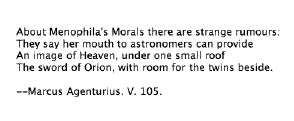
dkozubei@nyc.rr.com | dkozubei.com



